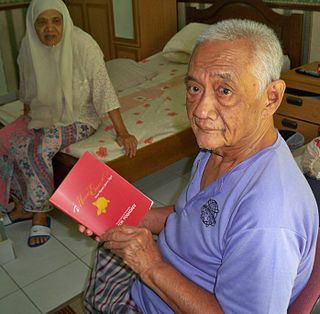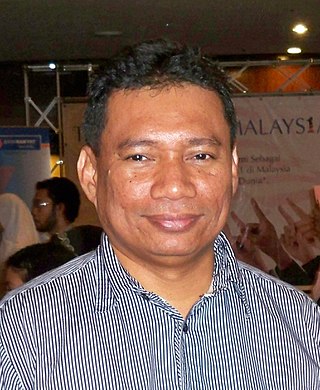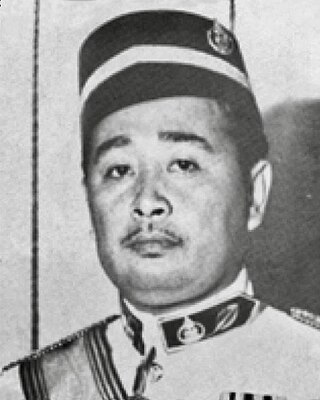
Nusantara is the Indonesian name of Maritime Southeast Asia. It is an Old Javanese term that literally means "outer islands". In Indonesia, it is generally taken to mean the Indonesian Archipelago. Outside of Indonesia, the term has been adopted to refer the Malay Archipelago.

The 1977 Southeast Asian Games, officially known as the 9th Southeast Asian Games, was a Southeast Asian multi-sport event held in Kuala Lumpur, Malaysia from 19 to 26 November 1977. This was the third time Malaysia hosted the games and its first since 1971. Previously, it also hosted the games for the first time in 1965. Brunei, Indonesia, and the Philippines were finally admitted into the SEAP Games Federation in February that year. Although the word 'Peninsula' was omitted from the new federation title to reflect the expansion, in which the games is the first games to bear the name, its emblem, and the sequential numbering of the games was kept to provide continuity, as well as reverence to the objectives, aspirations and contributions of the founders. The six-ring emblem was not replaced until 1999, when the present ten-ring emblem was first used in an official games logo. The games was opened and closed by Yahya Petra, the King of Malaysia at the Stadium Merdeka. The final medal tally was led by Indonesia, followed by Thailand and the Philippines, with host Malaysia in fifth place.

The 1989 Southeast Asian Games, officially known as the 15th Southeast Asian Games, was a multi-sport event held in Kuala Lumpur, Malaysia from 20 to 31 August 1989 with 25 sports featured in the games. It was officially opened by 9th Yang di-Pertuan Agong, Sultan Azlan Shah. Although Cambodia did not participate, Laos returned to compete for the first time under the new federation name in this edition of the games, while Vietnam fields their own delegation to the event for the first time as a unified country.
Ishak Haji Muhammad, better known as Pak Sako, was a Malaysian writer, active in the 1930s until the 1950s. He was a nationalist and his involvement began before independence and continued thereafter. He fought for the idea of the unification of Melayu Raya where Indonesia, Malaysia and Brunei are united in one collective.

Malay was first used in the first millennia known as Old Malay, a part of the Austronesian language family. Over a period of two millennia, Malay has undergone various stages of development that derived from different layers of foreign influences through international trade, religious expansion, colonisation and developments of new socio-political trends. The oldest form of Malay is descended from the Proto-Malayo-Polynesian language spoken by the earliest Austronesian settlers in Southeast Asia. This form would later evolve into Old Malay when Indian cultures and religions began penetrating the region, most probably using the Kawi and Rencong scripts, some linguistic researchers say. Old Malay contained some terms that exist today, but are unintelligible to modern speakers, while the modern language is already largely recognisable in written Classical Malay of 1303 CE.

Dato' Haji Shahnon bin Ahmad was a Malaysian writer, a National Laureate, and a Member of Parliament. He was awarded with the National Literary Award in 1982. He was also a Professor Emeritus at Universiti Sains Malaysia in Penang.
MABBIM is a regional language organization which is formed to plan and monitor the development of the Malay language and its many national standards in the region. It consists of three countries - Brunei, Indonesia and Malaysia.

Muhammad Dahlan Abdul Baing, whose pseudonym was Arena Wati, was a Malaysian writer. He was declared as the Malaysian National Laureate in 1988. His writings were in the Malay language. He also known as Duta Muda dan Patria.
The Writers' Movement '50, better known as Asas '50, is the first and oldest literary association in post-war in Singapore. It was founded on 6 August 1950, with a stated philosophy of "Art for Society".

Syed Mohd Zakir Bin Syed Othman Al-Yahya, is a Malaysian writer of prose, poetry, and theatrical texts.

Fatimah Busu is a Malaysian novelist, short-story writer, and academic. She is one of the leading contemporary authors of fiction in the Malay language, actively publishing since the 1970s. She is also the foremost Malay-language literary critic.

Khalidah Adibah binti Amin, known professionally as Adibah Amin, is a Malaysian writer, columnist, teacher, translator and actress.

Victor A. Pogadaev is a Russian historian, orientalist, and translator. He specializes in the history and culture of South-East Asia and translates literary works from Malay and Indonesian into Russian and vice versa. He is also a noted lexicographer.

Noordin Hassan is a Malaysian playwright and Malaysian National Laureate.

Great Malay Nusantara is a literary association in Malaysia. Founded in 2011 on the initiative of the famous Malaysian poet, S.E.A. Write Award winner, Malaysian National Laureate Ahmad Kamal Abdullah. The goal of the organization is to promote the Malay language and Malay literature in the world, to develop contacts and cooperation between the writers of Nusantara countries.

Raja Rajeswari Setha Raman is a Malaysian poet and translator. Tamil by ethnicity. She is also a lecturer of the Teacher Education Institute, Malay Language Campus.
Suratman Markasan was a Singaporean poet, novelist and literary pioneer. He was awarded the Cultural Medallion, the S.E.A. Write Award, the Anugerah Sasterawan Mastera and the Singapore Literature Prize.

Dato Seri Utama Dr. Ustaz Haji Mohammad Zain bin Haji Serudin, pen name Shukri Zain, is a Bruneian nobleman, politician and poet who formerly held the position of Minister of Religious Affairs from 1986 to 2010. He has traveled abroad and made significant literary contributions to Malay-Islamic literature, including Islamic poetry and usage of his own Malay language to convey his poetic ideas. He also was the leader or president of the Brunei Youth Council (BYL), and a member of the Privy Council.

Yahya bin Ibrahim, pen name Yahya M.S., was a nobleman, poet and politician from Brunei who served as the Deputy Minister of Religious Affairs from 1986 to 2005, and the Chief Syar’ie Judge. He had a career in the government service of Brunei, in which he held a number of important positions such as being a member of the Privy Council of Brunei. Additionally, he was considered one of the first to write Islamic poetry in the country.

Muslim bin Burut, pen name Muslim Burmat, was a writer from Brunei who wrote a great deal of literature, particularly novels and short stories that are used in Brunei's educational institutions. In addition to receiving numerous literary honours, his works—which are primarily realistic but also include fresh historiography—showcase aspects of Brunei society.
















